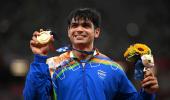While many Western countries, including the United States, Britain and Australia, are diplomatically boycotting the Winter Olympics over China's human rights record, Putin will join a number of Beijing-friendly leaders at the Games.

Mixed doubles curling opened competition at the Beijing Winter Olympics on Wednesday as the shadow of war in Ukraine, and the impending arrival of Russian President Vladimir Putin, loomed over an event already transformed by the coronavirus pandemic.
Curling teams from Sweden and Britain clashed inside Beijing's "closed loop", where the world's athletes will compete until Feb. 20 in front of crowds made sparse by COVID-19 curbs.
Basketball great Yao Ming and a Chinese soldier wounded in a border clash with India joined in a torch relay set to last just three days and only be viewed by selected members of the public before the Olympic cauldron is lit.
But the political showdown between Putin and the West over Ukraine remained the main Olympic act ahead of Friday's opening ceremony, which the Russian president will attend in a show of unity with Chinese leader Xi Jinping.
"Putin is very busy now. He is here because he has to be," said Shi Yinhong, an international relations professor at Beijing's Renmin University. "Putin knows China is indispensable for Russia, just as Russia is indispensable for China."
While many Western countries, including the United States, Britain and Australia, are diplomatically boycotting the Winter Olympics over China's human rights record, Putin will join a number of Beijing-friendly leaders at the Games.
Saudi Arabia's Mohammed bin Salman, Pakistan's Imran Khan and Mohammed bin Zayed al Nahyhan of the United Arab Emirates were among several Middle Eastern and Asian leaders expected to attend. From Europe, only Poland and Serbia have said they will send their heads of state.
UN Secretary-General Antonio Guterres will also attend the opening ceremony, telling reporters last month it was not a "political visit".
"The Olympic ideal is something that we have to cherish, and that is the reason why I am going."
Putin, who on Tuesday accused the West of luring Russia into war, has not said whether he will meet other world leaders while in Beijing.
His talks with Xi, however, will be closely watched for signs of increasing cooperation between China and Russia, which have grown closer as both of their ties with the West have soured.

The Kremlin has said that Putin and Xi would spend a "lot of time" discussing security in Europe and the demands Russia has made of the West, and that Putin would certainly brief his Chinese counterpart about Russia's talks with NATO.
Putin was to fly to Beijing on Thursday and he and Xi would have lunch together on Friday and could sign more than 15 agreements, Kremlin aide Yuri Ushakov told reporters. Russia and China would discuss greater gas and financial cooperation, he said.
He said serious efforts were being undertaken to create joint financial infrastructure that would be resistant to sanctions.
Russia was not supposed to have a presence at the Games as part of doping sanctions designed to punish Moscow for having doctored laboratory data that would have helped international anti-doping authorities identify drug cheats.
Putin will watch Russia's athletes competing in their third consecutive Olympics without their flag and national anthem.
Alexander Gabuev, chair of the Russia in Asia-Pacific Program at the Carnegie Moscow Center, predicted that Putin and Xi could ink a deal to increase capacity of the Power of Siberia, a 4,000 km (2,485 miles) pipeline that transfers gas from eastern Russia to China.
"Even if we put the whole international political situation aside, it will be an important visit during which some decisions can be outlined," said Vasily Kashin, a China specialist at Moscow's HSE University.
While increasing cooperation between Russia and China might be cause for concern in the West, analysts expect Xi to walk a fine line when it comes to Ukraine.
China would likely prefer to have the situation in Ukraine demand heightened U.S. diplomatic attention without requiring Beijing to take sides, said Bonny Lin, a senior fellow and director of the China Power Project at the Center for Strategic and International Studies.
"Beijing has said this: It's not in their best interest for there to be an actual conflict in Ukraine," she said.
"The best scenario for China is to more or less maintain the current state, maybe deescalate a little bit, but get just enough attention that it diverts the U.S. away from Indo-Pacific, but doesn't actually force China to do anything or to take any hard costs."
It will be up to the United States to show the rest of its allies in the region that it is not being so distracted by Ukraine that it has forgotten about China, said Derek Grossman, a senior defence analyst at the RAND Corporation.
US state department spokesman Neil Price told a briefing on Monday that the Biden administration was more than prepared to manage diplomatic efforts on multiple fronts.
"We're a large country. We're a large department. Not to use once more an overused metaphor, but we can walk and chew gum at the same time."













 © 2025
© 2025